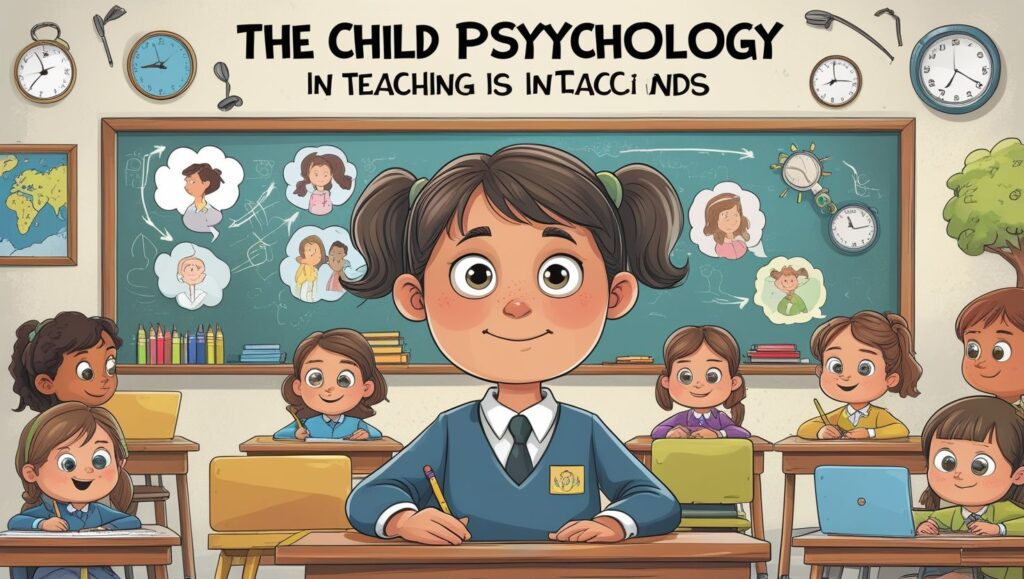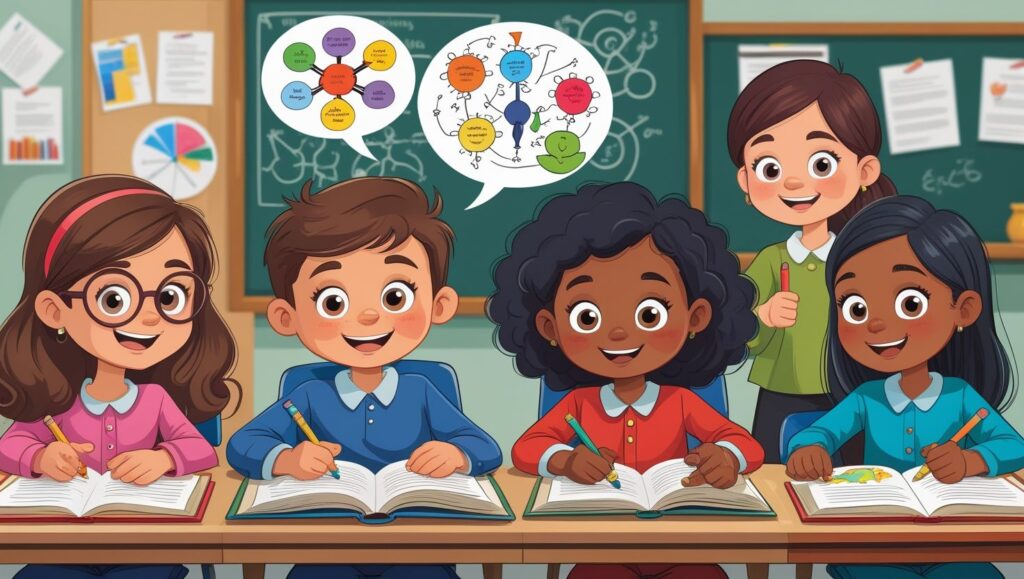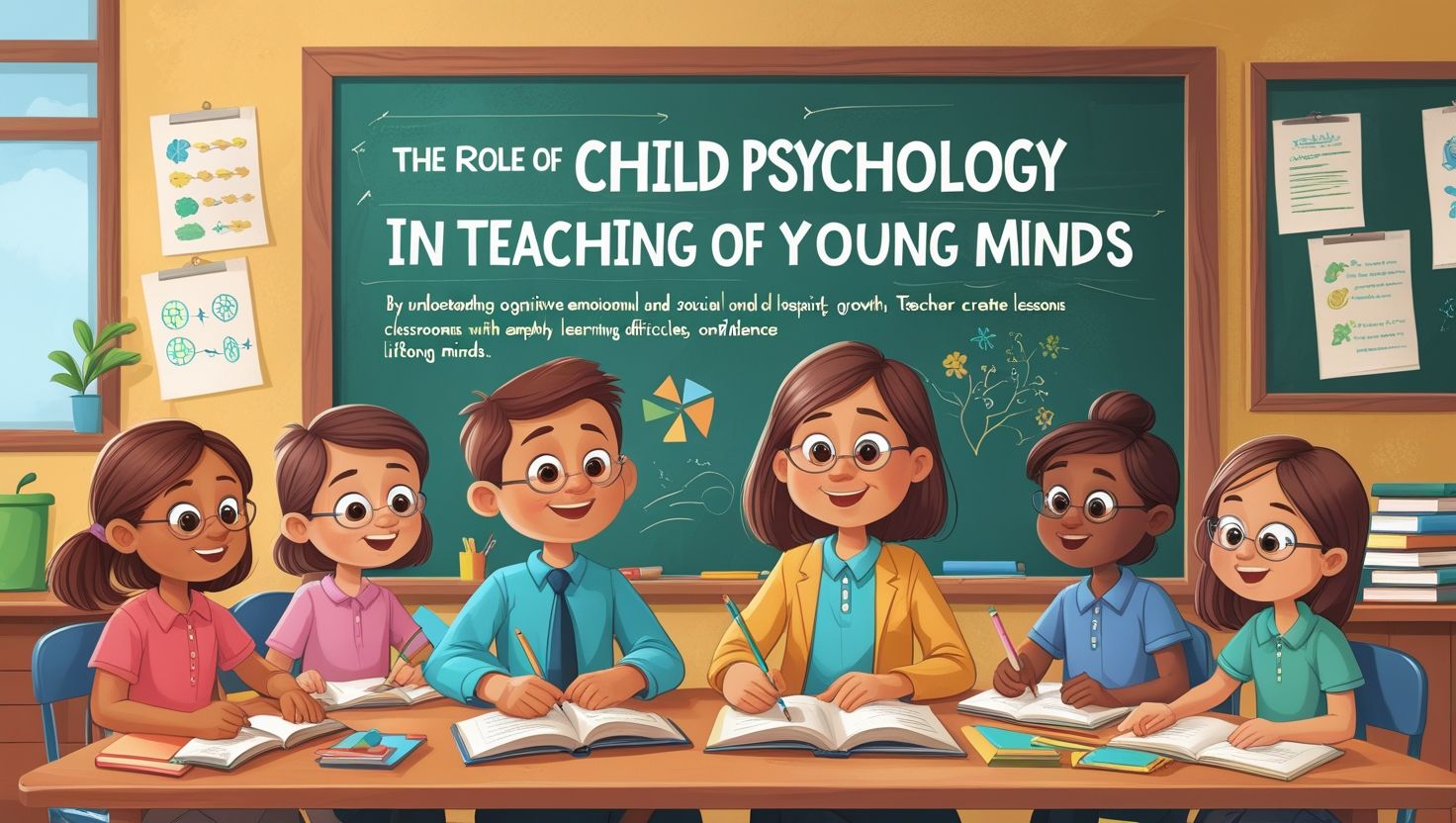Introduction
Role of Child Psychology in Teaching, Child psychology plays a crucial role in the teaching process. Teachers interact with learners of different backgrounds, abilities, and emotional needs. Therefore, understanding the psychological development of children helps educators design effective lessons. Moreover, it assists in identifying the best approaches to motivate learners. Child psychology is not limited to behavior alone; it also covers cognitive development, emotional growth, and social interactions. Teachers who study psychology understand why children behave in certain ways. Consequently, they adapt their methods to suit learning needs. This leads to positive learning experiences for both students and teachers.
In addition, child psychology helps in recognizing barriers to learning. By addressing these issues early, teachers can prevent academic failure. Similarly, understanding the stages of development enables educators to apply age-appropriate strategies. Thus, teaching becomes more meaningful and productive. Overall, knowledge of child psychology transforms classrooms into nurturing environments. It allows teachers to guide students effectively while promoting holistic development.
Understanding Cognitive Development
Cognitive development is central to child psychology and teaching. Children go through different stages of thinking as explained by theorists like Piaget and Vygotsky. Consequently, teachers must adapt lessons according to these stages. For example, younger children think concretely, while older learners handle abstract ideas. Hence, teachers should match instructional materials with the learner’s mental abilities. This ensures better comprehension and retention. Furthermore, awareness of cognitive growth allows teachers to design step-by-step learning activities.
They can simplify complex concepts for younger learners and gradually increase difficulty levels. Additionally, cognitive development links directly with problem-solving skills. Teachers who understand these processes encourage creativity and critical thinking. They use questioning techniques that challenge learners. Moreover, they provide activities that stimulate imagination and logical reasoning. Without this knowledge, teaching may fail to reach the child’s intellectual capacity. Therefore, understanding cognitive development creates a strong foundation for effective instruction. It ensures students progress at their own pace while building confidence.
Emotional Development and Learning
Emotional development significantly affects how children learn in school. Teachers who understand this area of psychology manage classrooms more effectively. A child’s emotional state influences concentration, memory, and behavior. For instance, anxiety or sadness reduces participation. On the other hand, encouragement and praise increase motivation. Consequently, teachers must provide emotional support alongside academic guidance. Furthermore, emotional intelligence allows children to handle stress and cooperate with peers. Teachers who recognize signs of emotional difficulties can intervene early. They may offer counseling or adapt lessons to reduce pressure. Additionally, creating a safe environment promotes self-expression. Students feel free to share ideas without fear of judgment.
Moreover, emotional development shapes personality and attitudes towards education. Supportive teachers build positive relationships that last beyond the classroom. Therefore, understanding emotions is not optional for effective teaching. It is a necessity. Ultimately, child psychology enables educators to balance academic expectations with emotional needs. This produces confident and well-adjusted learners.

Social Development and Classroom Interaction
Social development is another essential aspect of child psychology. Children learn not only from books but also through interaction with peers. Teachers who understand social psychology encourage collaboration and teamwork. Consequently, students develop communication skills and empathy. For example, group projects and peer discussions improve social competence. Furthermore, positive social interaction builds a sense of belonging. When children feel accepted, they participate more actively in class. Moreover, teachers can manage conflicts effectively by applying social psychology principles. They teach problem-solving, respect, and cooperation. Additionally, social development impacts leadership and responsibility. Teachers can assign roles during activities to promote confidence. Understanding peer influence is equally important.
Children often imitate their classmates’ behaviors. Therefore, teachers must create supportive groups that inspire good habits. Moreover, social psychology helps in reducing bullying and exclusion. Teachers apply strategies to promote inclusion and fairness. Ultimately, social development in teaching creates a cooperative learning atmosphere. It enables children to grow as responsible and empathetic members of society.
Classroom Management through Psychology
Effective classroom management depends heavily on child psychology. Teachers must understand why children behave differently. Consequently, they can handle misbehavior positively. Instead of punishment, teachers apply psychological strategies such as reinforcement. Rewarding good behavior encourages repetition. Similarly, setting clear rules helps children develop self-discipline. Furthermore, knowledge of psychology allows teachers to identify attention-seeking behavior. They can respond with empathy rather than frustration. Additionally, classroom management requires awareness of learning styles. Some children prefer visual aids, while others learn through movement or sound.
Teachers who adapt lessons reduce disruptions and increase engagement. Moreover, psychology helps teachers maintain balance between strictness and friendliness. Too much control reduces creativity, while too much freedom causes disorder. Therefore, psychological insights create harmony in classrooms. They allow teachers to keep focus on learning while addressing behavioral challenges. Ultimately, effective management ensures that students feel respected and motivated. With the right psychological approach, classrooms become spaces for discipline, cooperation, and active learning.
Motivation and Child Psychology
Motivation drives learning, and psychology explains how to inspire students. Teachers must understand what encourages children to perform. Some are motivated by rewards, while others are motivated by curiosity. Therefore, teachers use both intrinsic and extrinsic motivators. For instance, praise and recognition boost confidence. Meanwhile, interesting activities stimulate internal motivation. Moreover, understanding psychological theories of motivation helps in designing lessons. Teachers can apply Maslow’s hierarchy of needs by ensuring safety, belonging, and esteem. Consequently, children feel secure and ready to learn. Additionally, goal-setting plays a significant role.
When teachers guide students to set realistic goals, motivation increases. Furthermore, understanding individual differences ensures fair encouragement. Some learners need extra support, while others require challenges. Teachers who adapt strategies make all students feel valued. Moreover, motivation links directly with persistence. Psychologically informed teachers help children overcome failure and try again. Ultimately, motivation is a bridge between psychology and teaching. It enables children to reach their full potential with enthusiasm.
Identifying Learning Difficulties
Child psychology is essential in identifying learning difficulties. Some children struggle with reading, writing, or attention. Without psychological knowledge, teachers may misunderstand these struggles as laziness. However, conditions like dyslexia or ADHD require special attention. Consequently, teachers must observe carefully and refer cases when necessary. Early detection prevents long-term academic problems. Furthermore, psychology provides strategies to support struggling learners. For example, breaking tasks into smaller steps reduces pressure. Similarly, using multisensory teaching methods improves comprehension. Moreover, understanding learning difficulties builds empathy.
Teachers treat affected students with patience rather than criticism. Additionally, psychology emphasizes inclusive practices. By adapting materials, teachers ensure that all learners progress together. This approach prevents isolation and low self-esteem. Furthermore, collaboration with parents and psychologists strengthens support systems. Teachers who communicate effectively provide consistent guidance both at school and home. Ultimately, psychology empowers teachers to address learning barriers effectively. It ensures that every child receives equal opportunities to succeed academically and socially.

Teacher-Student Relationship and Psychology
The relationship between teacher and student is deeply rooted in psychology. A positive bond encourages trust and openness. Consequently, children feel comfortable sharing problems and asking questions. This leads to better learning outcomes. Moreover, teachers who understand psychological principles build respect without fear. They balance authority with empathy. Furthermore, teacher-student relationships shape self-esteem. Supportive teachers boost confidence and resilience.
On the other hand, harsh criticism lowers motivation and creates anxiety. Therefore, psychology guides teachers to use constructive feedback. Additionally, the teacher’s attitude directly affects classroom climate. Enthusiastic and caring teachers inspire curiosity and cooperation. Moreover, understanding attachment theory explains why relationships matter. Children who feel secure with teachers engage more actively. Furthermore, these relationships extend beyond academics. They influence social and emotional growth. Teachers become role models who shape behavior and values. Ultimately, psychology highlights the importance of healthy teacher-student connections. It transforms teaching from instruction into mentorship. This relationship becomes the foundation for lifelong learning.
Conclusion: Integrating Psychology into Teaching
The role of child psychology in teaching cannot be underestimated. It provides insights into cognitive, emotional, and social development. Consequently, teachers adapt methods to meet children’s needs. Moreover, psychology assists in classroom management, motivation, and identification of difficulties. It builds stronger teacher-student relationships and promotes inclusive education. Furthermore, applying psychological principles ensures balanced growth of knowledge, skills, and character.
Teachers who ignore psychology risk misunderstanding students and reducing learning outcomes. On the other hand, educators who embrace it create nurturing classrooms. They combine academic instruction with emotional and social support. Moreover, psychology helps teachers act as mentors, not just instructors. It encourages respect, empathy, and cooperation. Ultimately, integrating psychology into teaching leads to holistic development. It transforms education into a meaningful journey. Therefore, every teacher should value child psychology as an essential tool. With this understanding, schools can prepare children not only for exams but also for life.
References
- Piaget, J. (1970). Psychology and Pedagogy. Penguin.
- Vygotsky, L. S. (1978). Mind in Society: The Development of Higher Psychological Processes. Harvard University Press.
- Maslow, A. H. (1943). A theory of human motivation. Psychological Review, 50(4), 370–396.
- Woolfolk, A. (2019). Educational Psychology (14th ed.). Pearson.
- Santrock, J. W. (2021). Children (15th ed.). McGraw-Hill.

Sakıp Sabancı Museum tour Safe and comfortable tour environment. https://joost-niemoller.nl/?p=6016
Istanbul hidden gems tour Perfect for a half-day or full-day sightseeing. http://electromecanicamx.com/?p=20612
Hi! I realize this is sort of off-topic however I had to ask.
Does building a well-established blog such as
yours take a lot of work? I am completely new to operating
a blog but I do write in my journal every day. I’d like to start a blog
so I can easily share my experience and feelings online.
Please let me know if you havbe any recommendations or
tips for new aspiring bloggers. Appreciate it! https://Glassi-greyhounds.mystrikingly.com/